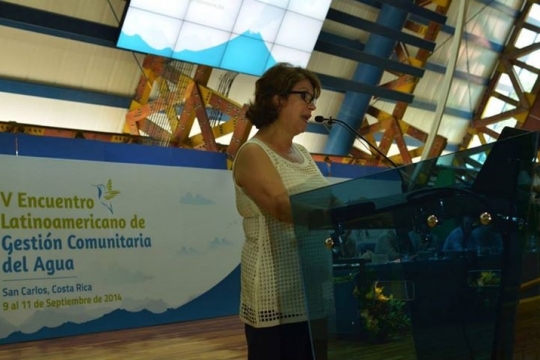Community -based drinking water organizations (CBDWOs) are responsible for providing water for domestic consumption to 26.5% of the population in Costa Rica. The “Water for human Consumption, Communities and Climate change: expected impacts and Adaptation in Central America” (AC3 project), project aims to improve decision-making about investment in the design of plans and policies for CBDWOs’ adaptation to climate change in Central America. At the 5th Latin American Meeting of Community Water Management, AC3 project coordinator Eugenia León sat down and talked with the new CEO of the Costa Rican Institute of Aqueducts and Sewers (AYA), Yamileth Astorga, Msc.
During Mrs. Astorga’s presentation at the opening ceremony, part of her speech focused on the importance of CBDWOs. We asked Mrs. Astorga: What is the priority in terms of capacity building that the institutions have to address for these CBDWOs?
“Every water system must begin with the capture source,” Mrs. Astorga responded. "If the source of water collected is not clean, then a source of pollution starts. This has been the case for many aqueducts. Therefore, we must strengthen the technical aspects of how systems are built. CBDWOs do not have this knowledge, and that makes them build water systems based on limited local experience,” she continued. “Therefore the water systems stop working in a short period of time, not necessarily due to lack of water, but instead due to lack of technical knowledge. CBDWOs are not financially capable of hiring professionals. Also, in past years, there has been a lack of support from the AyA toward CBDWOs, which has aggravated the problem.”
“We must ensure the quality of water,” added Mrs. Astorga. “The water systems often receive maintenance; however, the source is often forgotten. We also have to acknowledge the effect of climate change, and it is essential to think about what are our sources of water, and make projections of what we will need and how to look for alternative sources so that we can take action.”
Mrs. Astorga identified the importance of universities and research centers; the support that AyA as an institution needs in terms of assessments of water quality, water treatment systems for human consumption, and alternative technologies (preferably low-cost and for small populations); and how this input from research projects and institutions will help build the correct way to support CBDWO.
The AC3 project is run by CATIE with financial support from IDRC, a Canadian-based development organization. CBDWOs, as the core of research for the AC3 Project, are of fundamental importance in water management in Latin America and the Caribbean because they are the major suppliers of water for domestic consumption in these areas and therefore will be directly responsible for meeting the challenges imposed by the driest climate scenarios.
